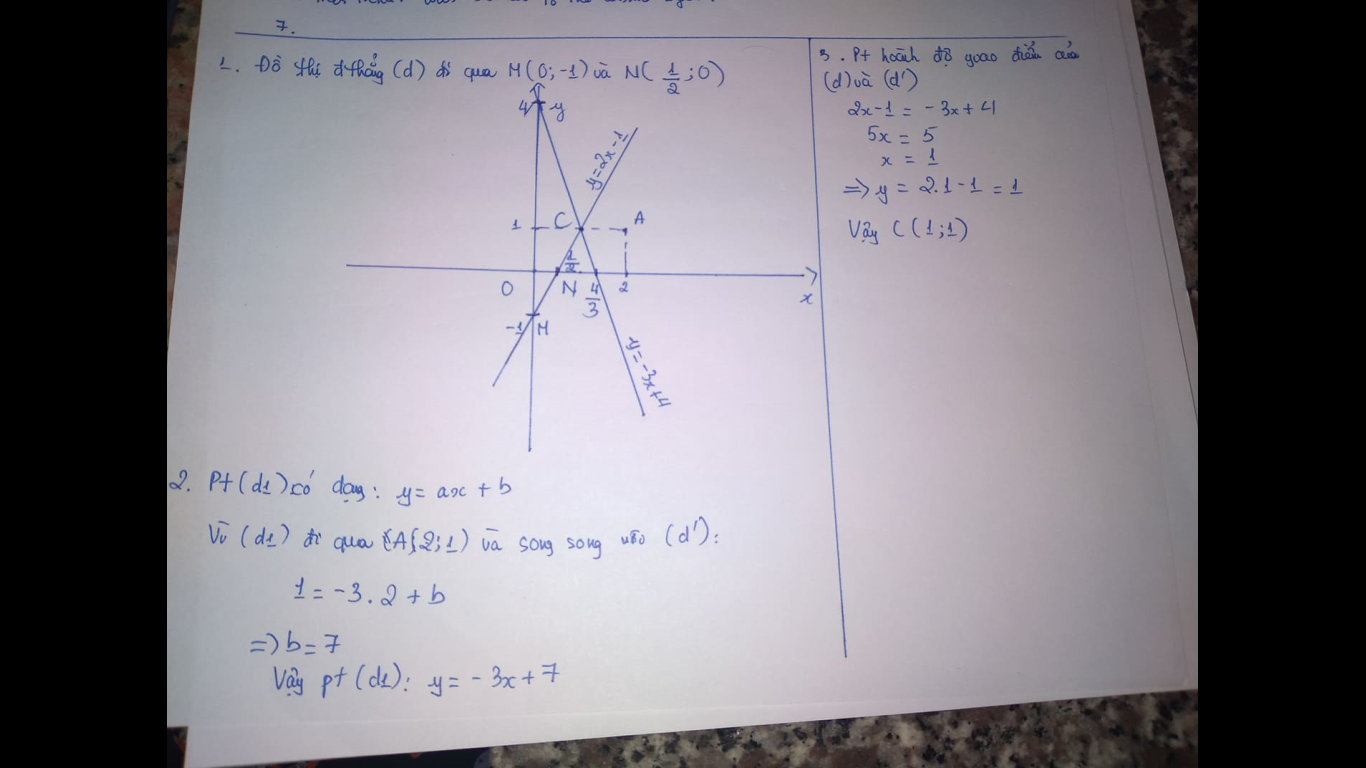Hãy nhập câu hỏi của bạn vào đây, nếu là tài khoản VIP, bạn sẽ được ưu tiên trả lời.

b) Vì A(xA;yA) là giao điểm của (D) và (D1) nên Hoành độ của A là nghiệm của phương trình hoành độ giao điểm có hai vế là hai hàm số của (D) và (D1)
hay \(-x-4=3x+2\)
\(\Leftrightarrow-x-4-3x-2=0\)
\(\Leftrightarrow-4x-6=0\)
\(\Leftrightarrow-4x=6\)
hay \(x=-\dfrac{3}{2}\)
Thay \(x=-\dfrac{3}{2}\) vào hàm số y=-x-4, ta được:
\(y=-\left(-\dfrac{3}{2}\right)-4=\dfrac{3}{2}-4=\dfrac{3}{2}-\dfrac{8}{2}=-\dfrac{5}{2}\)
Vậy: \(A\left(-\dfrac{3}{2};-\dfrac{5}{2}\right)\)
c) Vì (D2) song song với (D) nên a=-1
hay (D2): y=-x+b
Vì (D2) đi qua điểm B(-2;5)
nên Thay x=-2 và y=5 vào hàm số y=-x+b, ta được:
-(-2)+b=5
hay b=5-2=3
Vậy: (D2): y=-x+3
b) Vì A(xA;yA) là giao điểm của (D) và (D1) nên Hoành độ của A là nghiệm của phương trình hoành độ giao điểm có hai vế là hai hàm số của (D) và (D1)
hay \(-x-4=3x+2\)
\(\Leftrightarrow-x-4-3x-2=0\)
\(\Leftrightarrow-4x-6=0\)
\(\Leftrightarrow-4x=6\)
hay \(x=-\dfrac{3}{2}\)
Thay \(x=-\dfrac{3}{2}\) vào hàm số y=-x-4, ta được:
\(y=-\left(-\dfrac{3}{2}\right)-4=\dfrac{3}{2}-4=\dfrac{3}{2}-\dfrac{8}{2}=-\dfrac{5}{2}\)
Vậy: \(A\left(-\dfrac{3}{2};-\dfrac{5}{2}\right)\)
c) Vì (D2) song song với (D) nên a=-1
hay (D2): y=-x+b
Vì (D2) đi qua điểm B(-2;5)
nên Thay x=-2 và y=5 vào hàm số y=-x+b, ta được:
-(-2)+b=5
hay b=5-2=3
Vậy: (D2): y=-x+3

b) Ta có: (d2): \(y=\dfrac{-x}{3}-\dfrac{1}{2}\)
\(\Leftrightarrow y=\dfrac{-1}{3}x-\dfrac{1}{2}\)
Gọi A(xA;yA) là giao điểm của (d1) và (d2)
Hoành độ của A là:
\(\dfrac{-1}{3}x-\dfrac{1}{2}=2-x\)
\(\Leftrightarrow\dfrac{-1}{3}x-\dfrac{1}{2}-2+x=0\)
\(\Leftrightarrow\dfrac{2}{3}x-\dfrac{5}{2}=0\)
\(\Leftrightarrow\dfrac{2}{3}x=\dfrac{5}{2}\)
\(\Leftrightarrow x=\dfrac{5}{2}:\dfrac{2}{3}=\dfrac{5}{2}\cdot\dfrac{3}{2}=\dfrac{15}{4}\)
Thay \(x=\dfrac{15}{4}\) vào hàm số y=2-x, ta được:
\(y=2-\dfrac{15}{4}=\dfrac{8}{4}-\dfrac{15}{4}=-\dfrac{7}{4}\)
Vậy: \(A\left(\dfrac{15}{4};-\dfrac{7}{4}\right)\)

a: tọa độ giao điểm M là:
\(\left\{{}\begin{matrix}2x-1=-x+2\\y=2x-1\end{matrix}\right.\Leftrightarrow\left\{{}\begin{matrix}x=1\\y=1\end{matrix}\right.\)

c: Vì (d2)//(d) nên \(a=-\dfrac{1}{2}\)
Thay x=-3 và y=0 vào \(y=\dfrac{-1}{2}x+b\), ta được:
\(b+\dfrac{3}{2}=0\)
hay \(b=-\dfrac{3}{2}\)

b. PTHDGD: \(\dfrac{5}{2}x-4=3x-1\Leftrightarrow\dfrac{1}{2}x=-3\Leftrightarrow x=-6\Leftrightarrow y=-17\Leftrightarrow A\left(-6;-17\right)\)
Vậy \(A\left(-6;-17\right)\) là tọa độ giao điểm
c. Gọi \(\left(d_1\right):y=ax+b\left(a\ne0\right)\) là đt cần tìm
\(\left(d_1\right)//\left(d\right);A\left(-2;3\right)\in\left(d_1\right)\Leftrightarrow\left\{{}\begin{matrix}a=\dfrac{5}{2}\\b\ne-4\\-2a+b=3\end{matrix}\right.\Leftrightarrow\left\{{}\begin{matrix}a=\dfrac{5}{2}\\b=8\end{matrix}\right.\)
Vậy \(\left(d_1\right):y=\dfrac{5}{2}x+8\)
Chúc bạn học tốt!